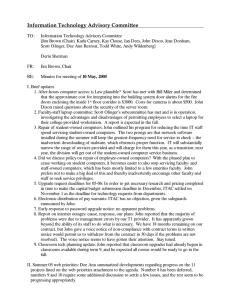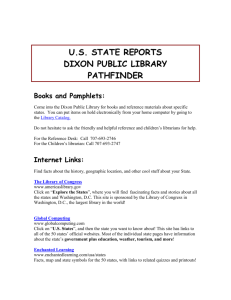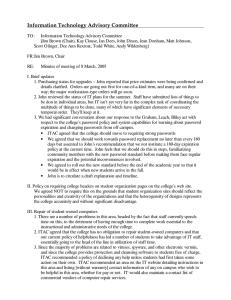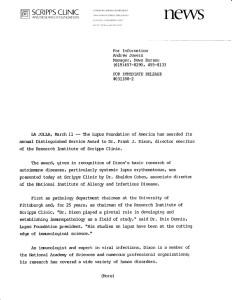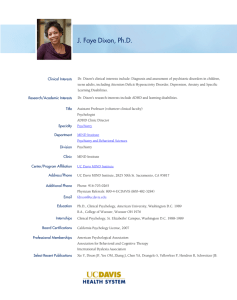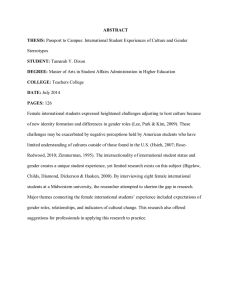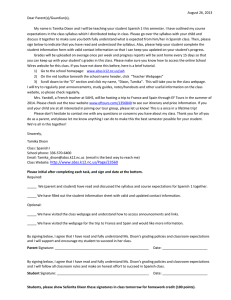Information Technology Advisory Committee
advertisement
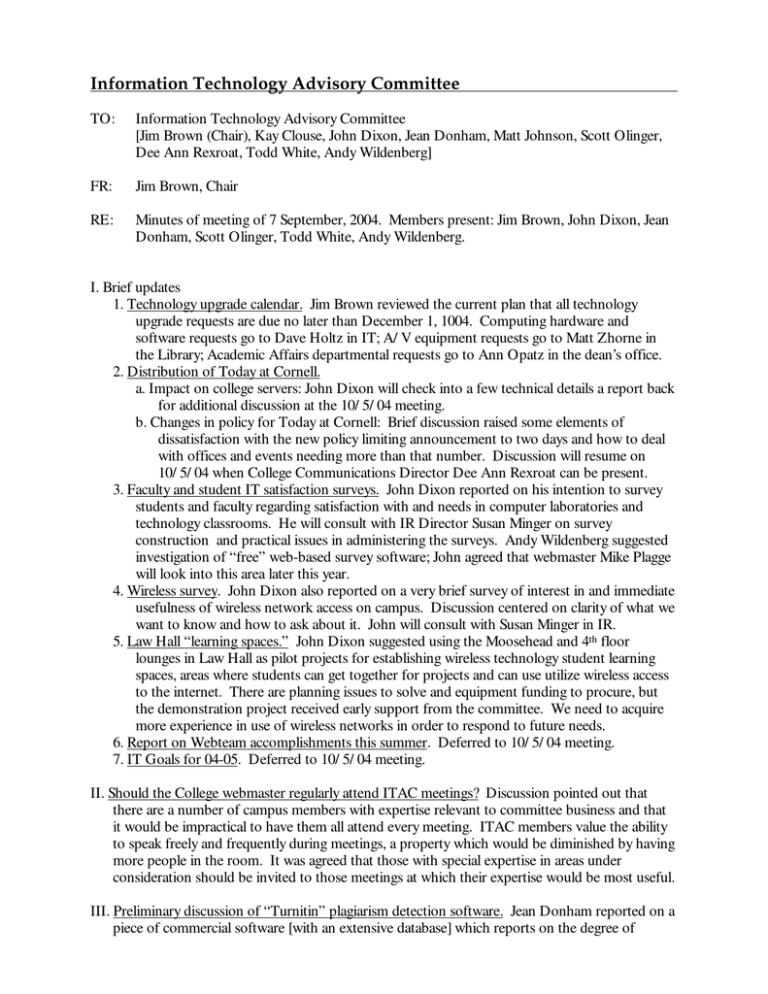
Information Technology Advisory Committee TO: Information Technology Advisory Committee [Jim Brown (Chair), Kay Clouse, John Dixon, Jean Donham, Matt Johnson, Scott Olinger, Dee Ann Rexroat, Todd White, Andy Wildenberg] FR: Jim Brown, Chair RE: Minutes of meeting of 7 September, 2004. Members present: Jim Brown, John Dixon, Jean Donham, Scott Olinger, Todd White, Andy Wildenberg. I. Brief updates 1. Technology upgrade calendar. Jim Brown reviewed the current plan that all technology upgrade requests are due no later than December 1, 1004. Computing hardware and software requests go to Dave Holtz in IT; A/ V equipment requests go to Matt Zhorne in the Library; Academic Affairs departmental requests go to Ann Opatz in the dean’s office. 2. Distribution of Today at Cornell. a. Impact on college servers: John Dixon will check into a few technical details a report back for additional discussion at the 10/ 5/ 04 meeting. b. Changes in policy for Today at Cornell: Brief discussion raised some elements of dissatisfaction with the new policy limiting announcement to two days and how to deal with offices and events needing more than that number. Discussion will resume on 10/ 5/ 04 when College Communications Director Dee Ann Rexroat can be present. 3. Faculty and student IT satisfaction surveys. John Dixon reported on his intention to survey students and faculty regarding satisfaction with and needs in computer laboratories and technology classrooms. He will consult with IR Director Susan Minger on survey construction and practical issues in administering the surveys. Andy Wildenberg suggested investigation of “free” web-based survey software; John agreed that webmaster Mike Plagge will look into this area later this year. 4. Wireless survey. John Dixon also reported on a very brief survey of interest in and immediate usefulness of wireless network access on campus. Discussion centered on clarity of what we want to know and how to ask about it. John will consult with Susan Minger in IR. 5. Law Hall “learning spaces.” John Dixon suggested using the Moosehead and 4th floor lounges in Law Hall as pilot projects for establishing wireless technology student learning spaces, areas where students can get together for projects and can use utilize wireless access to the internet. There are planning issues to solve and equipment funding to procure, but the demonstration project received early support from the committee. We need to acquire more experience in use of wireless networks in order to respond to future needs. 6. Report on Webteam accomplishments this summer. Deferred to 10/ 5/ 04 meeting. 7. IT Goals for 04-05. Deferred to 10/ 5/ 04 meeting. II. Should the College webmaster regularly attend ITAC meetings? Discussion pointed out that there are a number of campus members with expertise relevant to committee business and that it would be impractical to have them all attend every meeting. ITAC members value the ability to speak freely and frequently during meetings, a property which would be diminished by having more people in the room. It was agreed that those with special expertise in areas under consideration should be invited to those meetings at which their expertise would be most useful. III. Preliminary discussion of “Turnitin” plagiarism detection software. Jean Donham reported on a piece of commercial software [with an extensive database] which reports on the degree of originality of papers: that is, it reports how much overlap exists between any individual paper and papers in the database. Issues of intellectual property ownership make it uninteresting to us at this time. We did not examine costs. IV. After-hours IT emergency response services. John Dixon reported on how the IT staff currently handles requests for service to deal with major IT problems out of normal business hours. Discussion focused on how to define an emergency, how community members can be in contact with IT, how IT staff can be assigned to handle various situations, and how IT might keep the community informed about progress in handling problems. There are many difficulties in finding an optimal set of solutions for this class of problems. The primary limiting factors are the small size of the staff, the limited number of individuals who are qualified to deal with different kinds of emergency problems, and the financial consequences of having to pay for off-hours services. John will be identifying elements of an integrated plan for continuing ITAC discussion so that a comprehensive plan can be proposed. However, IT will publicize usable parts of the plan as they are identified and become part of IT policy. V. Review policy on maintaining email accounts for faculty who separate from the college. Deferred to 10/ 5/ 04 1. Use of automatic forwarding? 2. Storage space reduction? VI. Graham Leach Bliley Act regarding information security. Deferred to 10/ 5/ 04 meeting. VII. Upcoming agenda items: 1. Recommendations on printing/ copying charge backs to departments. 2. How to deal with students putting virus-infected computers on the network 3. How to deal with repair of student-owned computers 4. Windows service packs
